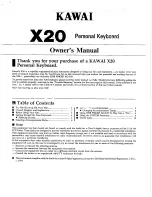
KDFX Reference
KDFX Algorithm Specifications
10-45
LoopLength
The delay length of the feedback tap. If feedback is turned up from
0%
, this parameter sets
the repeating delay loop length. In
Degen Regen BPM
, the loop length is speci
fi
ed as a
fraction or multiple of the tempo, in “beats.” The length of a delay loop in seconds can be
calculated from beats as T = (beats/tempo)
❃
60.
LFO Period
The feedback tap and the output taps lengths can be modulated with an LFO internal to
the effects processor. The rate at which the tap positions move are tied to a common
period control (time for one complete cycle) which is expressed in beats. The LFO Period
control is speci
fi
c to
Degen Regen BPM
. The depth of modulation is speci
fi
ed by the
LpLFODepth parameter. Frequency in Hz can be calculated from the period in beats as
F = tempo/(beats
❃
60). Since this moving delay tap is part of the feedback path through
the delay, subsequent passes of the signal through the delay may result in some strange
pitch modulations. It is possible to set LFO Period with LoopLength so that alternate
passes through the loop detune then retune the signal (for example, set the LFO period to
double the LoopLength). The maximum pitch shift up is not identical to the maximum
pitch shift down, so the alternating detune/retune effect is not perfect.
Bass Gain
The amount of boost or cut in dB that the bass shelving
fi
lter should apply to the low
frequency signal components. Every increase of 6 dB approximately doubles the
amplitude of the signal. Positive values boost the bass signal below the speci
fi
ed
frequency. Negative values cut the bass signal below the speci
fi
ed frequency. Since the
fi
lters are in the delay feedback loop, the cut or boost is cumulative on each pass the
sound makes through the loop.
Bass Freq
The center frequency of the bass shelving
fi
lter in intervals of one semitone.
Treb Gain
The amount of boost or cut in dB that the treble shelving
fi
lter should apply to the high
frequency signal components. Every increase of 6 dB approximately doubles the
amplitude of the signal. Positive values boost the treble signal above the speci
fi
ed
frequency. Negative values cut the treble signal above the speci
fi
ed frequency. Since the
fi
lters are in the delay feedback loop, the cut or boost is cumulative on each pass the
sound makes through the loop.
Treb Freq
The center frequency of the treble shelving
fi
lter in intervals of one semitone.
Midn Gain
The amount of boost or cut in dB that the parametric
fi
lter should apply to the speci
fi
ed
signal band. Every increase of 6 dB approximately doubles the amplitude of the signal.
Positive values boost the signal at the speci
fi
ed frequency. Negative values cut the signal
at the speci
fi
ed frequency. Since the
fi
lters are in the delay feedback loop, the cut or boost
is cumulative on each pass the sound makes through the loop.
Midn Freq
The center frequency of the parametric EQ in intervals of one semitone. The boost or cut
will be a maximum at this frequency.
Midn Width
The bandwidth of the parametric EQ may be adjusted. You specify the bandwidth in
octaves. Small values result in a very narrow (high-Q)
fi
lter response. Large values result
in a very broad response.
LpLFODepth
The feedback (loop) delay tap will have its position modulated by an LFO (internal to the
FX processor) if the LpLFODepth parameter is non-zero. A moving tap on a delay line will
result in a pitch shift, and LpLFODepth sets the maximum pitch shift (up and down) in
cents.
LpLFOPhase
Speci
fi
es the phase angle of the feedback (loop) LFO relative to the output tap LFOs and
the system (or MIDI) tempo clock, if turned on (see Tempo). For example, if one LFO is set
to
0°
and another is set to
180°
, then when one LFO delay tap is at its shortest, the other
will be at its longest. If the system (or MIDI) tempo clock is turned on , the LFOs are
synchronized to the clock with absolute phase.
Summary of Contents for K2661
Page 18: ...2 4 LFOs LFO Shapes...
Page 34: ...3 16 DSP Algorithms...
Page 54: ...5 4 MIDI Note Numbers Note Numbers for Percussion Keymaps...
Page 72: ...7 10 System Exclusive Protocol K2661 System Exclusive Implementation...
Page 82: ...9 4 Upgrading Sample Memory Choosing and Installing a SIMM for K2661 Sample Memory...
Page 334: ...10 252 KDFX Reference KDFX Algorithm Specifications...
Page 340: ...11 6 Glossary...
Page 382: ...12 42 Triple Modular Processing Alphanumeric Buttonpad Entries for DSP Functions...
Page 392: ...B 6 SysEx Control of KDFX MSB and LSB...
Page 442: ...D 20 Contemporary ROM Block Objects Controller Assignments Contemporary ROM Block...
Page 490: ...H 12 General MIDI Standard Mode Controller Assignments...
Page 492: ...I 2 Live Mode Objects Live Mode Programs...
Page 498: ...K2661 Musician s Reference Index...
Page 500: ......
















































